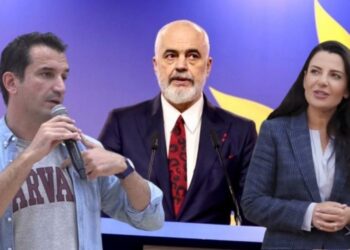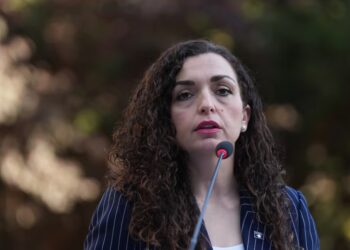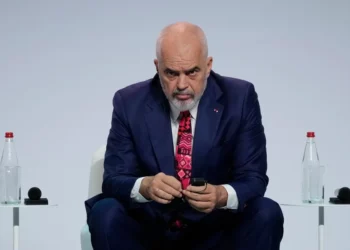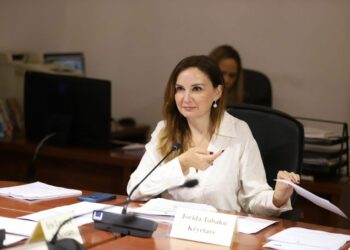By Boldnews.al
The government has taken seriously the import of fertilizers from all over Europe. Albania will soon return to a garbage land that will come from all over the world.
Following the initiative of three deputies Eduard Shalsi, Ervin Bushati and BujarDerveni, who demand the permission of the recycling industry to import waste plastics and paperboard with the argument that local waste production is not enough, the Ministry of Environment has rapidly made the procedures for issuing a concession.
Boldnews.al has exclusively provided the documents of the procedure for granting the concession, construction and administration of Fier Region urban waste treatment plant and power generation. It is learned that the source of funding is the state budget and the duration of the contract or the time limit for execution is 72 months or 2070 days (6 years) starting with the entry into force of the contract. It is learned that the area where construction will be carried out represents the end of the slope of the village of Portėz, it is flat with a small margin of quota. The altitude of the place is variable, from 55 m to 75 m above sea level.
Boldnews.al has provided information that waste will be recycled in this landfill that is expected to be imported from other countries. The speed of making this concession is also linked to the initiative of three lawmakers and, ahead of approval in Parliament, the Ministry of Environment accelerated the procedures. And so, the city of Fier will be turned into a garbage “barn” from all over Europe.
Feasibility study
Boldnews.al has also provided other documents, such as the feasibility study. It states that “the initiative for a waste recovery facility for energy recovery has for years been a potential and rather controversial alternative in the country, but no experience has yet become a reality. However, thanks to the latest technological developments, in recent years this technology has been widely used, especially in EU countries. ”
According to her, the results of the economic analysis of this study make it clear that this project is potentially workable from the technical, economic and environmental point of view. Assumptions about the amount and potential of urban and industrial waste in the Qark of Fier do not affect the level of implementation of the project.
“In fact, the prospect is expected to be positive in several directions: From an economic point of view, increase of future electricity price; From the environmental point of view, the potential to credit CO2 levels as a contribution to climate protection and health care by reducing the risks and reducing the various sources of infections. ”
According to the documents, the project finds institutional support at central and local level as a sustainable waste management solution in line with national waste management policy, national legal framework and international standards. Adding here that the project offers a sustainable economic solution, this is a potential and example to follow in the country.
Emergency for the project
The documents state that the project is expected to have key players at the national level such as the Ministry of Environment, Ministry of Energy and Industry and the Ministry of Finance.
“The centralized management and collection of urban waste in Albania is not in an advanced stage, coupled with infrastructure problems, lack of financial and technical capacities, and so on. The lack of modern and sanitary systems for urban waste management has brought a serious problem to the environment and people’s health. If we refer to progress reports of the European Commission to meet the requirements under the Stabilization and Association Agreement, the waste management situation in Albania for the years 2013, 2014 and 2015 is very bad, “said these documents. According to her, waste segregation is very limited and their recycling remains rare. Most of the waste continues to be safely deposited in legal and illegal landfills, or by burning them.
Landfill Project
The proposed project is an urban waste recycling plant (IPMU) with energy recovery by producing electricity. The concept of this project is one of the first in place to intertwine the MNU management with profit in power generation. It should be emphasized that this project is superior, compared to the deposit of waste directly to the landfill, both in environmental and economic terms. The main objective is to have a better management of the MNU, to utilize it in a much longer time to deposit and convert energy into energy.
The construction of this plant has advantages for the area and beyond because on the one hand MNU collection and collection is a serious problem in the country, technological treatment of MNU, avoiding any negative impact on the environment and the surrounding area. Moreover, we will benefit from energy for residents and businesses of the area and beyond. The Ministry of Environment, in cooperation with its partners, undertakes such a project bringing international and national experience, skills and professionalism.
The construction and management of the entire activity is proposed to be carried out by the concessionaire who will be awarded the winner after the completion of the competitive procedures, thus fulfilling the technological and environmental requirements at a contemporary level along the works and activity of the plant. For this reason, besides the preliminary project and this feasibility study, a number of geological, seismological, and so on studies have been conducted. as a supporting part of this proposal.
Location of the proposed site
The localized site for the plant is in the Municipality of Fier in the western Albanian lowland, 71 km south-west from Tirana. The area where construction will be carried out represents the end of the slope of the village of Portėz, it is of flat relief with a small margin of quota. The altitude of the place is variable from 55m to 75m above sea level. The proposed site for the realization of the plant is equal to about 6 hectares (60000 m2), taking into account the features of the chosen site, the need for additional space for any unforeseen situation, and above all for filling in any case of plant.
The required surface area may change during the final project phase. It can be greatly reduced due to the detailed study of the technical details of the concrete case. The selected site for the plant has an underdeveloped inclination. The foreseen area has an agricultural destination, but mostly leaves the yard. The land is public, part of the Administrative Ports Unit, Plyk Village, Cadastral Zone 3000, Parcel 8 (eight) and Parcels 6 (six), owned by Fier Municipality. It is regulated by City Council Decision No. 40 dated 26/10/2015, consequently there is no problem of ownership or uncertainty among the parties. This decision has been amended for the purpose of clarification by the Fier City Council Decision no. 25, dated 26.02.2016 “For a clarification on the 26.10.2015 Fier City Council” On the announcement of the environmental emergency in the field of integrated urban waste management in the Qark of Fier “decision no. 40. Under these conditions, given that Fier Municipality has made available the project site where the proposed plant will be built, it is not necessary that other public or private assets that will be part of or will be needed for this project .
Problems in the area
The documents state that during the construction period of the plant, the main concerns about air quality are mainly caused by the discharges of heavy vehicles, large amounts of dust and suspended particulates generated by construction activities such as excavation, storage or transport of soils and building materials, etc., damaging or eliminating vegetation. These releases are considered negative effects on the local environment, vegetation and human health are temporary only during construction and depend on other factors such as meteorological conditions, soil composition, and type of construction activities.
During the construction phase of the plant is expected to have the presence of noise and vibrations due to construction work, excavation and leveling of the square, heavy carriage, transport etc. Considering that the selected site is located on the outskirts of the city of Fier, we can anticipate that noise will be caused on the local roads to and near the construction site. This concern will be present both during the construction of the plant and during its operation. However, these effects are minor, located within or near the construction site as well as temporary. They can be minimized and addressed by the developer by following the appropriate technical measures and avoidance of work / movement of vehicles at night etc.
As a consequence of the operation and operation of the plant it is expected to have potential negative impacts on the flora and fauna of the area around the plant, which will minimally cause damage or disappearance of the flora and the displacement or fragmentation of the surrounding fauna. In general, the proposed site and the surrounding area are characterized by a slightly planted, spontaneously sprouted herbaceous environment. In the surrounding area are observed agricultural land and culture.
Respondents’ complaints
The Ministry has foreseen that construction of an urban waste incineration plant is expected to create an opposition or tension from communities around the proposed country, non-governmental organizations, local or national political representatives, local and national media, etc. Referring to similar international experiences, despite the fact that the proposed project comes as an urgent local and regional need and ensures a sustainable development of the urban waste management sector, it meets the environmental legal criteria, without any opposition from surrounding residents. The proposed facility will come close to flats and businesses around the construction site, on the outskirts of the city of Fier, and it may be necessary to relocate residents or local economies. Residents may lose lands or have an impact on individual economies or lose work in the informal sector of urban waste recycling etc. It is expected that these effects will be more sensitive to local communities at a distance of less than 250m.
Another local concern in the construction and operation of the plant is the increased traffic of heavy vehicles, air pollution, noise and vibration that annoy and disturb the surrounding residents in a wider radius.
Opposition of residents near the proposed facility is expected to be an important effect to be considered and addressed since the first steps of the announcement of the proposal. In fact, this effect is expected to be temporary mainly after the announcement of the proposal and during the construction and something less in the operational phase. Among the most effective measures to reduce the opposition from local communities is the identification of interest groups that can be directly or indirectly influenced, opposing the project or not supporting it. It is important that the nearby communities and residents of the city of Fier should be heard, become, or feel, beneficiaries and not losers of the project. Labor recruitment from the surrounding areas during construction and operation of the plant can be an effective measure to ensure their support. Transparency and communication with them, as well as remuneration or compensation, solving social or economic problems that are not necessarily related to the proposed project.
Ensuring the support and trust of local communities requires increased knowledge and awareness of the public and certain interest groups, requiring them to be part of emission monitoring procedures and effects during project implementation, verification of plans and mitigating and compensatory measures.
The land compensation process, if any, should be addressed before the start of plant construction work in cooperation with local and national authorities.
Objectives
The target of the winning company of the competition will be the processing of the urban waste of the Fier District, the generation of energy and the creation of a waste disposal site.
Objectives over the coming years will be:
- Building during 2016-2017 and putting into use in 2018 the Processing Plant and Urban Waste Disposal Facility for the Qark of Fier.
- Creation of Renewable Energy from the Processing of Waste;
- Protecting the environment of this area by increasing the air quality, cleaning the environment and eliminating surface and groundwater pollution in this area;
- Creating new jobs for residents of this area;


















